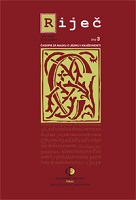Funktion der gegensätzlichen Begriffspaare bei der Behandlung der Toleranzfrage in Lessings Lustspiel Der Freigeist (1749)
The Function of the Binary Oposition within the Approach of the Tolerance in the Lessing’s Comedy the Free Spirit, Published in 1749
Author(s): Sally Mohamed GomaaSubject(s): Other Language Literature, Existentialism, Philosophy of Language, 18th Century, Theory of Literature
Published by: Filološki fakultet, Nikšić
Keywords: 18th century; Enlightenment; tolerance; Gothold Ephraim Lessing; Free Spirit (1749); binary oppositions;
Summary/Abstract: The paper deals with the Saxon comedy entitled The Free Spirit, published in 1740. The author has enlightened the Lessing’s understanding of tolerance from the point of numerous philosophical aspects related to it, which is the main reason for paying a special attention to the binary oppositions like sense and sensibility (or in other words reason and devoutness) vs. free spirit/ truth and happiness. The mentioned items haven’t been contrasted, but they actually form a whole system together. The fact that the main characters, Adrast and Teophan share the same opinion about many things turns out as a mistake. Lessing actually doesn’t stand for any special view of living. He, actually, sees the tolerance as a suppressing of rigidity of thinking which stands against any other way of thinking. The author believes that the tolerance has been born out of the constant search for truth. Many philosophical items (such as critics, doubt, contradiction or elusion) have been redefined giving some positive dimensions, understood as the elements of truth.
Journal: Riječ
- Issue Year: 2010
- Issue No: 3
- Page Range: 115-135
- Page Count: 21
- Language: German

